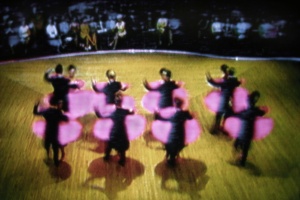
It takes no special awareness or media literacy to know that “reality TV” is an oxymoron. This has been the basic critique of the genre since its invention. “Despite the promise of unmediated access to the real,” Mark Andrejevic pointed out in in Reality TV: The Work of Being Watched (2004), “viewers are, according to this account, presented with yet another highly produced product of the culture industry.” This sets up a situation where viewers are offered an easy way to feel savvy, by seeing through reality TV’s pretense of authenticity to point out its implausibilities and barely concealed contrivances, as though we weren’t supposed to notice that everyone was performing for the cameras. By being so obviously staged, reality TV could allow viewers to see their own lives as given and “natural” rather than complexly mediated in their own right. The people onscreen are living in a spectacle; we watching are not.
Regardless of the specific subject of a specific show, reality television mainly foregrounds the effects of mediation itself, its distortions and opportunities. In their introduction to Reality TV: Remaking Television Culture, Laura Ouelette and Susan Murray write, “Reality TV promises its audience revelatory insight into the lives of others as it withholds and subverts full access to it. What results is an unstable text that encourages viewers to test out their own notions of the real, the ordinary, and the intimate against the representation before them.” The instability and incoherence of reality programming places viewers in a position of superiority, of being an authentic authority on what is really real.
But reality TV, like lots of other forms of contemporary advertising, lulls us into this sense of security to get us to relax our vigilance. We are sold on our own knowingness. Once we are confident about how hard we are to fool, we can reward ourselves by suspending our disbelief in what we know to be false. We can enjoy the onscreen promises as if they might really be fulfilled: that consuming the right things can change how we feel and who we are, that behaving as though we are being seen by millions can automatically confer integrity and maybe even dignity to our lives.
Reality shows allow us to experience visibility vicariously, to see reality transformed from a residue passively caught on film to a production elicited by it. We see the people onscreen looking at cameras, watching themselves being watched and calibrating their behavior accordingly. Even when they are set up for ridicule, they still partake in the dream that the camera can liberate us. The allegedly unrehearsed amateurism isn’t offered as unvarnished “reality” but a means of demolishing it.
Reality TV thus anticipates the performances elicited by social media. Throughout our days, we too find ourselves facing both a camera and a screen, thinking at some level about how we exist simultaneously in the zones they define and the rules they seem to impose. We watch with a sense of being watched built in.
It was once standard to critique reality TV for normalizing generalized surveillance under the auspices of voyeurism and exhibitionism. I need to be watched to know I have nothing to hide. I need to be watched to know I have value. For better or worse, such surveillance is largely taken for granted now. When the difference between seeing and being seen is dissolved, perspective itself is also abolished. There are then no views on reality; all reality exists as information in a state of equal exposure. There is no opposition between life and the media in which it’s documented, so it can’t be said that media distort or change what is real. It makes no sense to think about how we “perform for the camera” or to think other people are spectacles while we remain genuine. Any appeal to consciousness or sociality outside systems of information seems like nostalgia.
When reality TV stages its rituals of confession and exposure, they don’t reconstruct the illusion of a pre-existing personal privacy. They confirm what we are all coming to accept: “Reality” is not what evades capture — the unmediated “authentic” life lived in the moment purely for its own sake — but what can be mobilized for attention.
Linda Besner, in “Deleted Scenes,” discusses the history and function of behind-the-scenes footage in both scripted and “reality” TV and film. These extras promise to reveal the truth behind the fiction, or a deeper reality beneath the truth, but they ultimately demonstrate the constructed nature of any sense of reality and our discomfort with seeing it dismantled.
In “Sweet Nothings,” Kelli Korducki writes about The Bachelor, a reality show that gamifies the process of courtship not to reflect real life but rather re-envision it in a rationalized way. Taking for granted that social interplay is itself a game, the show’s audience aspires not to find love but to play well.
The U.S. president, previously a reality TV boss, has embedded himself in recursive feedback loops in the press and social media, seeming at once more exposed and more unfathomable. News carries the semblance developed in reality TV, that scenes shot, edited, and broadcast to millions are always allowing unprecedented glimpses “behind the illusion” into the lives of others — or as Besner puts it, “intimacy through illusion-breaking of the kind that, in real life, you often have to know someone a long time to achieve.” Viewers may achieve a particular paranoid lucidity, if they are alone with it for long enough, seeing behind the artifice to further artifice until the act of looking itself feels enchanted.
Featuring:
“Deleted Scenes,” by Linda Besner

“Sweet Nothings,” by Kelli Korducki

Thank you for your consideration. Visit us next week for Real Life’s next installment, OBJECTIVITY, featuring neoliberal bias in video games, gender bias in climate change strategies, and false neutrality in charity giving.